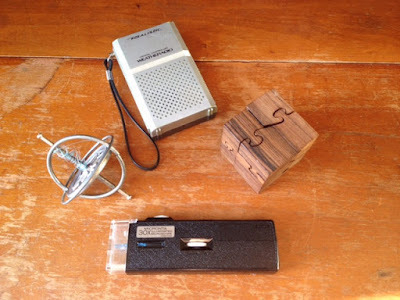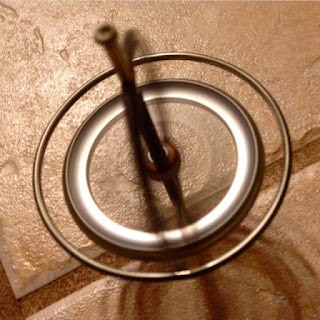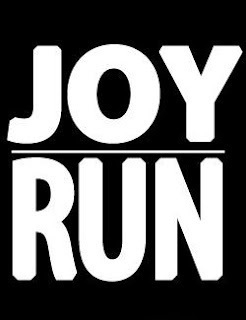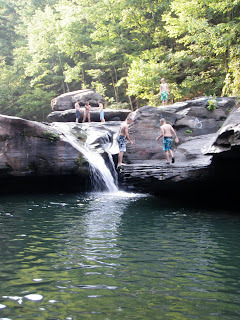gifts
My Father's Stories
Dear Dad,
We recently had a conversation about what kind of wisdom comes with age. We’ve both known some old people who seem unwise, and some young ones who are ahead of the game. And I think you and I (both of us now being over the trusted age of thirty) have occasionally been unwise in our post-adolescent days. Oh, well.
While I’ve known a few foolish geezers, over the years my respect for a certain kind of wisdom I see in you has continued to grow: your stories. Again and again when I have faced uncertainties in my life, I have returned to your stories.
Your stories aren’t doctrines, because that’s not what stories are. So I’m not saying they’re right or wrong. What matters is that they’re yours, and when you tell stories about your own life, they’re some of the truest stories I can imagine. You only mess them up when you try to explain them. That’s best left for Aesop. Your stories are more like compressed data. They do more work than any quantum computer I’ve heard of can do, and they are like a vein of gold that keeps growing and branching the more I dig into it. They explain themselves, and they are resilient.
Some of your stories are entertaining. My kids have heard stories of your experience in the National Guard so many times they probably not only think that I was there with you in that tank, they probably can imagine themselves in there, firing at trees hundreds of yards away in target practice.
But your stories do much more than entertain. They teach. When I think of you riding in the back seat of the car while your parents heard the news of the bombing of Pearl Harbor and you wouldn’t shut up, I feel like I am present there, and I feel like I am learning about my family, and what it means to be a family. You’ve never told me what Gram did when you were making too much noise, but that doesn’t stop me from remembering what I know of her, and imagining her response. And you haven’t mentioned your brother in that story either, but I can imagine him learning a lesson as well when Gramps turned around and smacked you to get you to shut up while he contemplated what was about to become of his military service, and of his wife and sons, and his widowed mother and his younger siblings. Just reflecting on that makes me think more seriously about my own obligations to others. It’s a tightly-packed story that is full of webs of relationships, and I am grateful for every time you’ve told me.
The same goes for all the stories you’ve told me about your life during the war, and afterwards. The way Gramps prepared you all for the trip back home while he prepared himself and his men for war. The way Uncle Charlie taught you to use the tools he knew. You’ve told me about Uncle Charlie so many times I wish I knew him myself. In fact, I think I do, through you.
Because, after all, your stories are also like tools. I think about the stories you’ve told me about how to take an engine apart so that you can put it back together again. I remembered that when I took apart my lawn mower engine once, and I thought about it the other day when I took apart the vacuum cleaner to figure out why it wasn’t working. I took out the parts methodically, and laid them out in order of removal, so that I could put them together again. You taught me about algorithms when I was a kid, sketching some out on napkins at the pizzeria in Woodstock, but also teaching me the word “algorithm” and then telling me stories that illustrated algorithms. You were making me a philosophy professor whether you knew it or not. Not bad for an electrical engineer!
A few years ago my youngest brought his friend over to our
house. Her car door wasn’t working right. He told her to park it in the
driveway and said that his dad could fix it. Somehow he knew that I wasn’t
afraid to take things apart and tinker with them. He also knows that I still
own and use tools you gave me when I was a boy. As we took apart that car door
there in our driveway, Matt watched and learned. Not long afterwards, when he
wanted to fix something on his own car—something he had never done before—he asked
to borrow my tools, and got to work. He was unafraid to use tools, and unafraid
to try something new. You know why? Because he saw it in me. And you know what
he saw in me? He saw you. Your stories—the ones you told and the ones you
showed me—those live in me all the time. Not surprisingly, he's now certified as an automotive electrician, and working as an auto mechanic. And he's good at his job. That's a picture of your stories, living in your grandson. I hope you're as proud of him as I am.
I think one of the things I have learned from your stories is a willingness to try to work with my hands to make good things. I’ve made a lot of the furniture in our house, and as you know, I’ve worked with stone and bricks and mortar on three different continents now. When I lay stone, I am always thinking about the structure in front of me, thinking about stresses and balance, physics and aesthetics. Despite a lack of formal training in engineering, standing beside you while you built a pier on the reservoir, or while you explained the bridge you built across the creek behind your house, gave me both the gumption to try building things myself, and a sense of what would work and what wouldn’t. Of course, that bridge also came with a lesson in law (which is why you couldn’t modify the banks) and a lesson in measuring the rate of flow of a river (something I had no idea how to do until you told me that day.) I can’t look at bridges and cantilevered and suspended structures without thinking of the engineering lessons you taught me through your stories.
The same is true for my adeptness with languages, and for my ability with music. Yeah, some of that is probably genetic (from you, again) but a lot of it is just learned fearlessness. I have never seen you turn away from a musical instrument just because you hadn’t yet received lessons in it. And I’ve seen you play in public many times, and your stories—I want to emphasize this—your stories of messing up have been a huge gift. “Don’t stop, just keep playing!” This is one of the things I tell my students now about public speaking, and about writing essays. “Always have a song you’re ready to play.” Years ago when I was having dinner at the home of the Lutheran Bishop of Nicaragua, someone handed me a guitar and said “Play us a song.” This was a complete surprise to me, but thanks to your stories, I was ready, and I led the whole group in several songs.
If I tried to write down all the stories you’ve told me, it would take a long time. I hope you continue to write down the stories you know. And I hope you tell them simply, unadorned, without feeling like they need to be dressed up. Just pick up that guitar and sing them, Dad. You have such a good voice, such a gift for music. You’re our family’s Homer, our Vergil.
In the same vein, if I tried to write down all the ways you show up in my classes, or in the ways I raised my kids, I doubt I’d be able to get it all down, but I hope this little letter at least gives you an idea of that. Those napkins you scribbled on at the pizzeria helped my kids do better in math and science. The times you told me about meeting someone who spoke another language and you tried speaking to them have indirectly emboldened your grandkids to study and work abroad in Asia, Africa, Latin America, and Europe. You taught me my first lessons in logic, and I taught them to my kids, and then your granddaughter grew up to be a far better reasoner than either one of us. Hopefully you and I will get a little credit for that when her biography is written—a little, but not too much. She deserves most of the credit for taking the stories we passed on, unpacking them, and then retelling them in her own way. And I love to watch her do that.
Speaking of languages, your stories have taught me in some other ways, too. Well before I could read Chomsky you mentioned him to me. I don’t remember what you said, but I remember the way you said it. It was like when you mentioned Feynman, Bernoulli, Les Paul, Vivaldi, Buckminster Fuller, Linus Pauling, or one of the other creative thinkers you were the first person to teach me about. Years later, when I was teaching at Penn State, one of my students mentioned Chomsky, and said wistfully that she wished she could have the chance to meet him. I asked her “Have you tried writing to him or giving him a call?” “I can do that?” “Why not?” I was passing along to her some of your willingness to try. After she went home to Boston for semester break she came to visit me in my office, and told me that she had called him and he invited her over to his campus. They talked for an hour over coffee. She was thrilled! That’s a win in your column, Dad. Well done.
When I was a boy you also bought me a subscription to Scientific American, and a copy of Van Nostrand’s Scientific Encyclopedia. I wish I still had that Van Nostrand’s. It’s horribly out of date, but I spent many hours paging through it, and it was a gift of love. People don’t often think of science as stories, but what else are scientific papers? They’re letters written to strangers, telling stories as clearly and as straightforwardly as they can. I remember reading about the work of Benoit Mandelbrot in Scientific American, and I have not stopped learning from that story ever since. If I had a list of how many times I’ve taught principles I learned from those articles, it would be a very long list. Another win in your column, I think.
I could go on for a long time, but I have more work to do today, so I’ll end here. I just wanted to say, in the form of a letter about stories, that I love you. Thanks for telling your stories, Dad. I keep telling them all the time.
With love,
Dave
*******
I write about my father in several places, including in my book Downstream. If you want to see some more of what I've written about him on this blog, click the "my Dad" link, below.
Gifts From My Father
The same is true for children: give them a hand lens, or an insect viewer, or a microscope with some prepared slides, and the world will suddenly become new to them. Dad planted that seed in me long ago. Now I carry a hand lens with me almost everywhere I go. I suppose the whole of my career is a reflection of the things that delight Dad and provoke his curiosity; most of them delight me and make me curious, too. And just as Dad passed on his curiosity to me, now it is my turn to pass it on to others.
Run For Joy
The prophets knew this thousands of years ago: we become like what we worship. We might think we don't worship, but I'm here to tell you that the way you spend your life is the way you worship. We all worship. Each of us ascribes worth to things by giving our time, our money, and our attention to them.
It's tempting to give our attention to monsters, to worship the devils that the news cameras follow breathlessly through the streets. It is tempting to worship our fears, to let the things that could steal, or maim, or kill become the focus of our attention. It is tempting to hold the horrors in our hearts until we form them into perfect idols. If that weren't tempting, the news would look very different.
Avoiding idolatry - by which I mean worshiping things that are not worthy of our precious lives and attention - takes a conscious and sustained effort.
It requires us to remember not the horror but the joy. It requires us to give up the cramped life of fear and to stretch ourselves in the exuberance of being alive, of having a body.
At their best, this is what marathons are about: exultation in the gift of living an embodied life.
So run with me. Shake off the terrors, and feel your muscles, your bones, your sinewed vitality. Wherever you are, get out there and feel a little of what the marathoners were feeling as they ran, the hard-earned joy of running, the joy of feeling alive with other people.
Let me add that I'm not an accomplished runner, so don't expect me to lead the pack. This will be a run, not a race. If you want to walk with us, push a stroller, or whatever lets you feel the joy of being alive, come and join us. Bring your joy.
A Gift Of A Sponge
I had no idea how to shop, of course, so my father asked me to think about what my mother liked. The only thing I could think was that I often saw her cleaning things: washing dishes, cleaning floors and windows, doing laundry. Obviously, she must like cleaning quite a lot.
So I decided to buy her a sponge.
My father balked at this, but I insisted. This is what she likes, this is what I want to buy.
Two events that followed have imprinted themselves forever on my memory, have made me forever grateful to my parents.
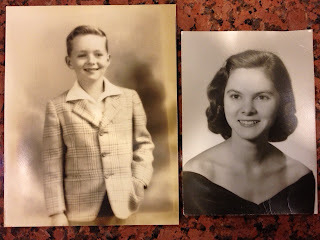 |
| Dad and Mom were young once, too. |
Second, mom loved it. Let me clarify that: she loved the gift, and she thanked me warmly and genuinely, smilingly. And so she gave me a gift as well, the gift of teaching me how to receive the offerings of others with grace; the gift of her love that consecrated my poor offering.
Both of them gave me another gift as well, of course: I had no money to buy the sponge, so I used theirs. I took their money and spent it on what they did not need, on a gift that, coming from another person or from me at a different age, would have been offensive. They gave me the gift of ennobling my shabby token into a gift of great worth.
No year of my life has passed in which I have not thought of that kitchen sponge. It reminds me that no act of kindness towards a child is wasted. It reminds me of my parents' love for me, love that I fumblingly attempt to pass on to my children as I seek to give them the difficult gift of autonomy.
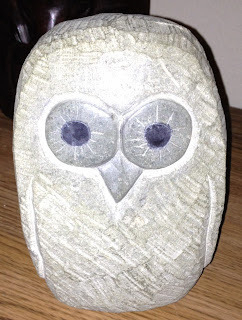 |
| A gift from my students; it means more to me than words can easily say. |
And my parents, in that Christmas, gave me hope that the poor offerings of my worship - in which I spend what is not really mine in order to give a gift that is not really needed - might really matter, not because they are intrinsically great, but because of the love and grace with which they might be received, and consecrated.
People Of The Waters That Are Never Still
My family has since lost the languages those ancestors spoke, and this fusion of tribes has adopted the linguistic fusion of English. I have no intention of claiming a legal place among either of the nations from which I am descended, nor even to name them here. But I find that the memory of both, and of the lands they lived on, is rooted deeply in my consciousness of who I am. Last year, while visiting the British Museum, I saw a display of various Native American peoples, including my own. It was the only time a museum has moved me to tears. The words and ways of my forebears may be mostly gone, but they are not forgotten. My father taught me to remember them and what they knew of the land we lived on, and often, while teaching me to know the woods, he would remind me that those woods were old family acquaintances.
Jacob Wawatie and Stephanie Pyne, in their article "Tracking in Pursuit of Knowledge," cite Russell Barsh as saying that "what is 'traditional' about traditional knowledge is not its antiquity but the way in which it is acquired and used." Our word "tradition" comes from Latin roots that mean something like "giving over" or "handing down." Traditional knowledge is knowledge that is a gift from one generation to the next, a gift we give because we ourselves were given it. I am grateful to my father, in ways that I may never have told him - in ways that perhaps words cannot begin to tell - for the traditions he learned and loved and passed on to me. I'm grateful that he has not let me forget.
There is, of course danger in emphasizing one's heritage and one's roots, especially if we make that the source of a distinction between ourselves and others, or a way of diminishing the lives and traditions of others. Just as much as it matters to me that I am from the people of the waters of the Catskills, it matters to me that my ancestors shared those waters with one another, people from two continents recognizing, each in the other, the waters from which both arose.
For all that I have received, for the traditions like waters pouring over the cliffs, gifts like the Kaaterskill Creek, let me give thanks. Let me give thanks with my life, offering to those who come after me, a taste of the sweetness of those same waters.
